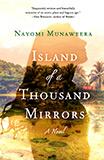Summary | Excerpt | Reading Guide | Discuss | Reviews | Beyond the Book | Readalikes | Genres & Themes | Author Bio

There are the usual hours of sweat- drenched, pushing, ripping pain before a tiny creature slips forth. A boy! The gods have been benevolent! But wait, Beatrice Muriel on her childhood bed is still sweating, still straining and pushing. With a final effort, a great gush of red, another child slips headfirst from salt water into the wide, airy world. The women submerge the child in the waiting basin of water, hoping to reveal some lighter, more appropriately golden skin tone. The water turns hue, but the baby does not, and Beatrice Muriel, taking in the pair, one eggplant hued and the other milk- tea fair, cries, "If only it had been the boy who was so dark! This black- black girl! We will never get her married." To which her mother joins, "A darkie granddaughter. Such a shade we have never had in our family. Must be from the father's side!" There, revealed for all to see, on the skin of this girl, the stain of low- caste origins. Beatrice Muriel, torn and exhausted from birthing, hangs her head in shame.
Because by this time what had not been known before the nuptials has since been revealed. Namely, that sometime in the years before seeking out matrimony, the Doctor had paid a visit to the local registrar's office, where he had worked a sort of alchemy. A handsome bribe to replace his family name, Aposinghe, with its fishy associations and marketplace odors, for the princely sounding Rajasinghe. In this way the Doctor, like so many low- caste persons, had escaped the limitations of fate to win both medical training and wife.
The back room of the house is the Doctor's dispensary. On the walls, dusty emerald bottles display their variously oily or transparent contents. On the verandah, patients gather each morning. They are fishermen and farmers who often pay in kind. A large thora fish for the health of a child, a pound of paddy rice for an ointment to ease a grandmother's arthritic knees. The Doctor is dedicated to this motley group of patients, but lacks further ambition and is most satisfied walking the beach with his children.
Often Beatrice Muriel finds him in conversation with fishermen, toddy tappers, servants, sometimes even the Tamil coolie who comes to empty the latrine buckets each dawn. When she sees him talking to this blackened djinn who smells of shit and carries the stiff- bristled broom with which he performs his inauspicious duties, it takes all her willpower to walk past them, her stiffly held head eloquent in its disapproval.
She has been brought up with definite ideas about the value of each thing and person, its significance and appropriate place on a strict hierarchy. She is unable to tolerate this laxity, her husband's inability or indeed conscious decision not to treat each person according to ancient laws. Her anger takes aim for her husband's head through her children's ears.
"In my father's day, those people kept out of sight. If one of them had come into the village spreading misfortune and bad smells everywhere, he would have been beaten with his shitty broom. This is your father's fault. Talking to these people. Treating them like every other person. If it were up to him, you know what you all would be doing?" Big- eyed children attempt to imagine. "You would be gathering up shit with that one. Would you like that? Going door to door in the morning emptying out the buckets of kakka with your hands and a small broom?" Children shaking their heads emphatically. No, they would definitely not like that.
To counter her husband's carelessness, Beatrice Muriel buys thora fi sh. She boils it slowly and then pours the water on the thirsty earth of the front yard. She sets the dish in front of her family with great festivity. "Now they will know what kind of people we are." Outside, the pungent odor rises. Passersby inhale with distended nostrils and know that the family has feasted on the most expensive sea fish.
Excerpted from Island of a Thousand Mirrors by Nayomi Munaweera. Copyright © 2014 by Nayomi Munaweera. Excerpted by permission of Thomas Dunne Books. All rights reserved. No part of this excerpt may be reproduced or reprinted without permission in writing from the publisher.
Your guide toexceptional books
BookBrowse seeks out and recommends the best in contemporary fiction and nonfiction—books that not only engage and entertain but also deepen our understanding of ourselves and the world around us.